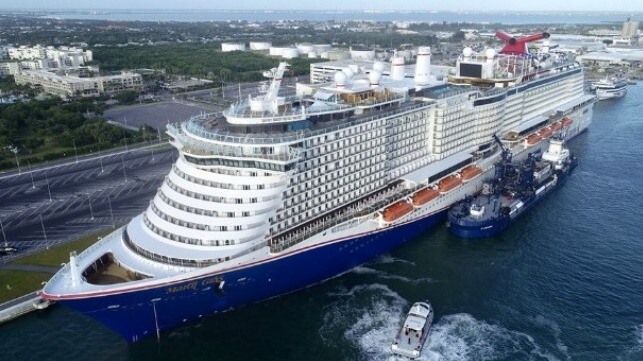Shipping Industry Initiative Seeks to Measure and Abate Methane Slip

A collation of leading companies from across the shipping industry are coming together in the latest effort to address the ongoing controversy over methane emissions from ships fueled with LNG. The Methane Abatement in Maritime initiative is a technology acceleration program aimed at identifying, accelerating, and advocating technology solutions to measure and manage methane emissions, commonly referred to as methane slip.
The shipping industry has been quick to adopt LNG in the last few years at least as a bridging fuel to support decarbonization due to its ability to reduce or eliminate harmful emissions including CO2, Nitrogen Oxides (NOx), Sulfur Dioxide (Sox), and particulate matter. Scientists, environmentalists, and other activists however argue that any benefits are far outweighed by the release of unburnt methane which is more harmful to the environment as it is a potent greenhouse gas that accelerates global warming.
In establishing this new initiative, the organizers point out that “no globally recognized methods for measuring methane slip” currently exist. As part of their aim to minimize the environmental impact of LNG used in shipping, their first goal is to establish a methodology of measuring the extent of the problem and developing technologies to reduce methane slip. It is hoped that the new solutions identified by the innovation initiative will help the industry to understand the extent of, and then manage, their methane emissions activities.
“Shipping currently lacks the information and tools they need to accurately measure the amount of methane released by LNG-fueled ships and the extent of this impact,” said Steve Price, Head of Partnerships at Safetytech Accelerator, which will lead the program. “Understanding the extent of this methane slip will allow companies, society, and policymakers to understand LNG’s real environmental impact. Empowering markets to channel investments to new technologies that can reduce methane slip, or to other transition fuels.”
LNG advocates argue that new engines and technologies are largely eliminating methane slip from the ships. Environmentalists however dismiss these assertions and last year one group used infrared cameras to illustrate what they said is an increasing problem for the shipping industry as the number of LNG-fueled ships increases.
Since 2010, the number of vessels using LNG has grown consistently by 20 to 40 a year. In its market analysis released yesterday, DNV for example said that LNG vessels make up the majority of in-service and on-order vessels using alternative fuels. The class society calculates that there are over 900 LNG-fueled vessels operating and another 500 ordered.
The new initiative will define what constitutes negligible methane emissions and then ensure that the sector meets the targets. Once the solutions have been validated, this collation will seek to endorse them to the industry. They are also committed to encouraging the adoption of proven abatement technology at scale. Their goal is to have solutions in place by 2023. Separately, there are several other groups also working on developing filtering technology to remove methane from vessels’ exhaust.
This new program is also focusing on supporting the next generation of biofuels. They highlighted that measuring the scale of methane emissions, and understanding if they can be managed to negligible levels, would contribute to the understanding of Liquefied Bio Methane (LBM) and Liquefied synthetic methane (LSM) and if they are viable pathway fuels to help achieve the industry’s 2050 decarbonization targets.
Established by Lloyd’s Register, the program will be led by Safetytech Accelerator. Seven industry-leading companies, Maran Gas Maritime, Mediterranean Shipping Company, Carnival Corporation, Seaspan, Shell, Lloyd’s Register, and Knutsen Group, are partnering with the program. It will also draw on the expertise of academics, civil society, and other stakeholders, such as the National Physical Laboratory.
